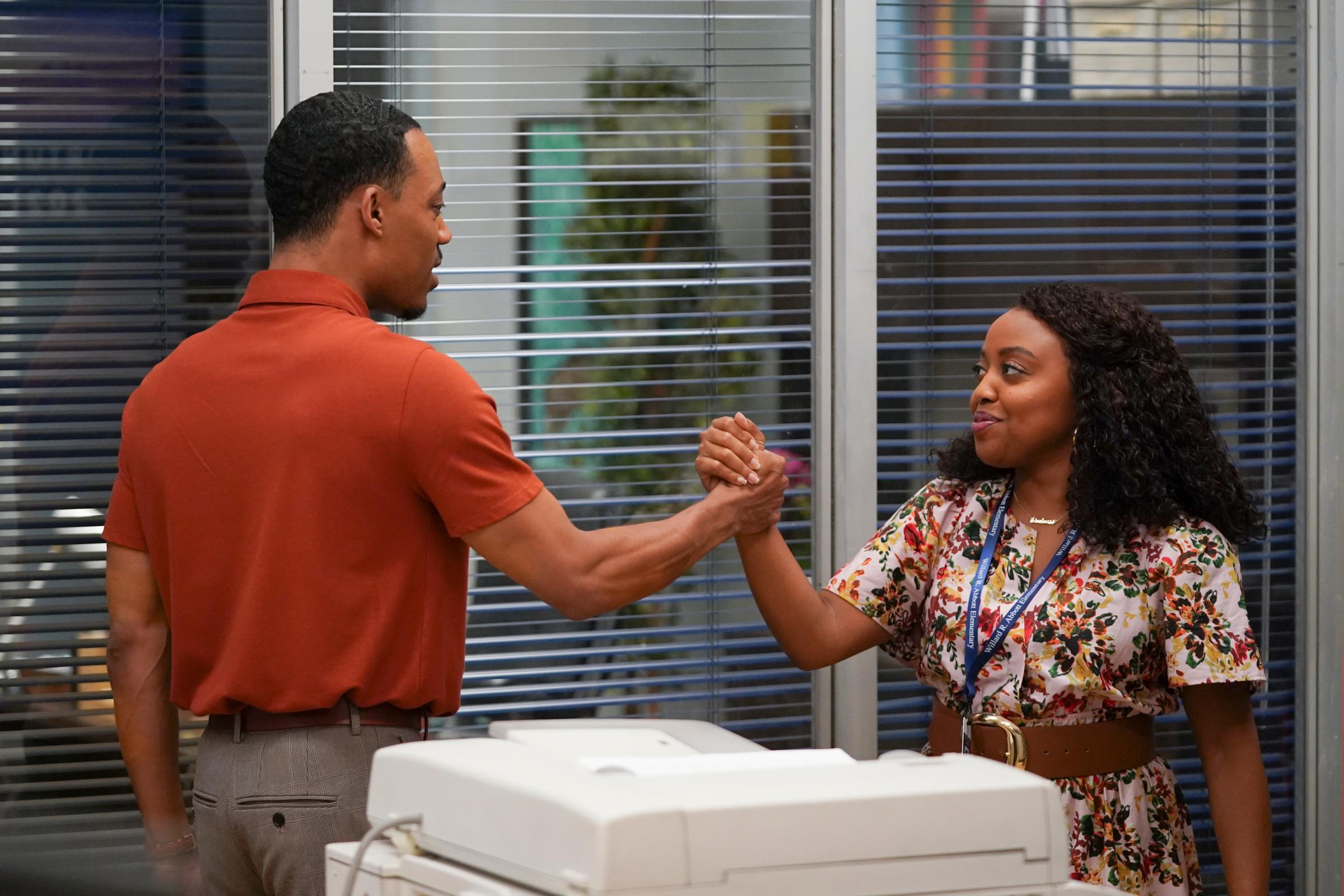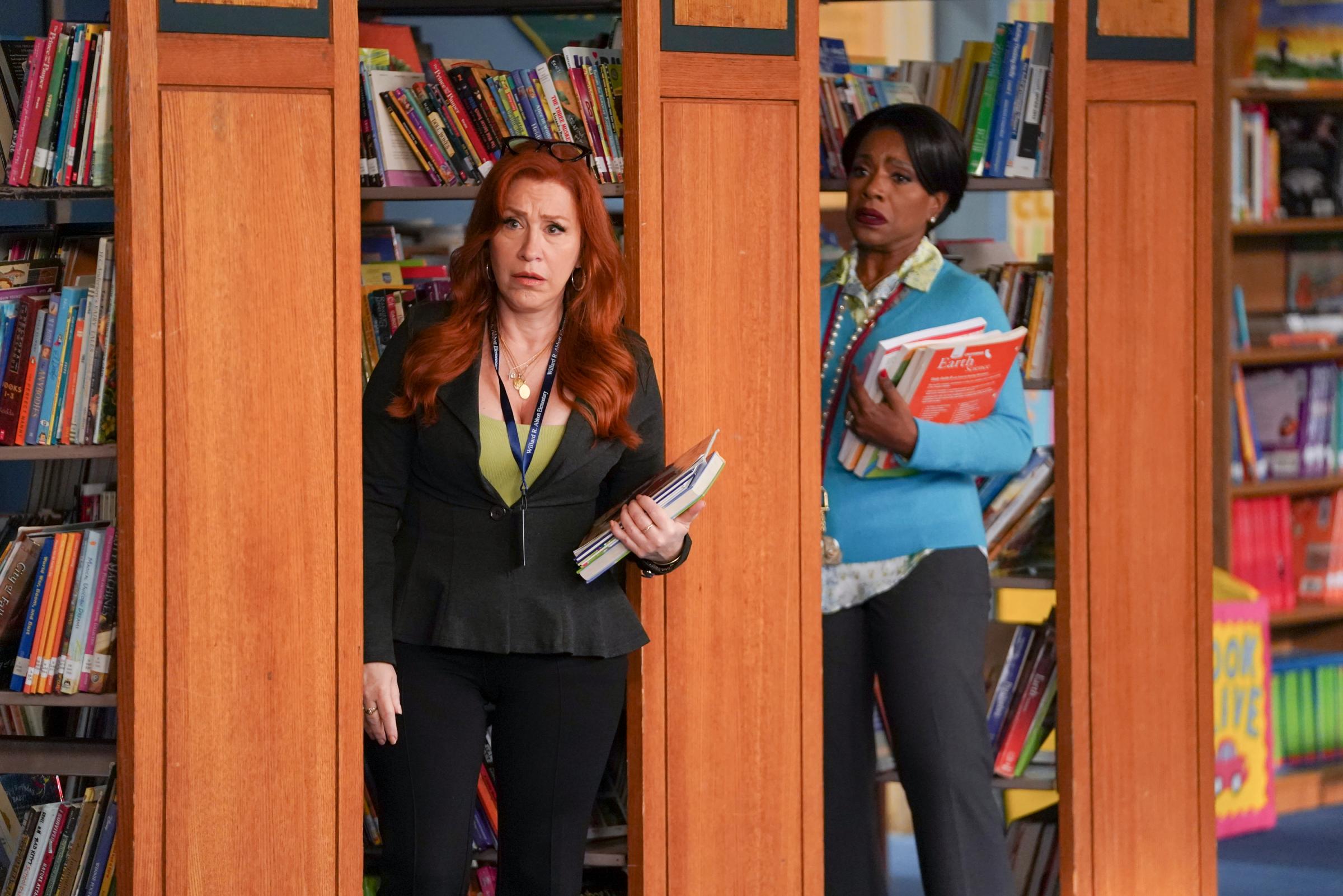In the series premiere of Abbott Elementary, one of the most lovable TV comedies in recent memory, something horrifying happens. Overwhelmed on her first day in the classroom, a rookie teacher kicks her young student. The scene is a case study in the dangers of staffing public schools with inexperienced educators. Her immediate firing also serves a narrative purpose; we learn that the substitute sent to replace her, Gregory (Tyler James Williams), was hired to be Abbott’s new principal, before narcissistic, woefully unqualified Ava (Janelle James) blackmailed the superintendent to get the job. He becomes a love interest for our protagonist, the try-hard young teacher Janine (played by creator Quinta Brunson). By the episode’s end, her cheery presence has helped convince him to stick around, and their will-they-or-won’t-they plot begins.
Most sitcoms, even really good ones like New Girl and It’s Always Sunny in Philadelphia, take a while to find their voices. But ABC’s Abbott, which returns on Sept. 21 with three brand-new Emmy Awards to its name, emerged with a unique, fully formed point of view. Though it slots into a familiar subgenre, as a sweet, single-camera mockumentary in the tradition of The Office, Parks and Recreation, and Modern Family, the show works because it never fails to contextualize its kindness within a real world where the latter is in short supply.

Situated in a poor, largely Black Philadelphia neighborhood, Abbott is the quintessential under-resourced urban public school. And Brunson’s depiction of that setting is unflinching. The building is crumbling; infestations and foul odors abound. (Janine and Gregory’s meet-cute happens in a restroom, where he’s trying to help a boy who has peed all over himself, she’s escorting a girl who vomited in class, and a broken toilet has been spraying water everywhere.) There’s no room for basics like up-to-date textbooks, cleaning supplies, and classroom rugs for the littlest kids to sit on in the anemic budget. Many parents are disengaged—not because they don’t care, but because supporting a family on low-wage work is more than a full-time job.
Not everyone on staff is particularly devoted to the children. Ava doesn’t even pretend she’s not exploiting her leadership role for cash, clout, and perks. We also learn that, of the couple dozen new teachers who started at Abbott the previous fall, only Janine; Jacob (Chris Perfetti), a white social-justice guy who’s desperate to be liked by his students; and one other colleague returned for a second year. But the committed faculty members who make up the show’s core cast of characters are there for a reason—and, as veteran teacher Barbara (Emmy-winning standout Sheryl Lee Ralph) notes, “it sure ain’t for the money.” They want to do the very best they can for kids who rarely get to enjoy the best of anything. We know they have real-life counterparts because America’s increasingly strained public school system hasn’t collapsed yet.
Although everyone has the same goal, the teachers don’t necessarily agree on how to achieve it. Barbara, one of those magical kid whisperers who never loses control of her classroom, and her friend Melissa (Lisa Ann Walter), a street-smart Philly girl to the core, have been so disappointed by administrators and local governments for so long that they’re resigned to make do with the meager resources they’re given—or go outside the system to get what they need. (Melissa’s “got a guy” for everything.) Younger, more idealistic teachers like Janine and Jacob aren’t ready to give up on their conviction that it’s possible to change the system from within. They’re almost always proven wrong, but practical support from the more experienced teachers and genuine concern for their students keeps them going when it would be easier to give up.

Television has no inherent obligation to represent real life. Some of the greatest comedies of our time, from Atlanta to Community, thrive on fantastical flourishes. But there’s something deceptive, in these cruel times, about the typical “nice” sitcom—one that’s set in a world just like our own, except kinder. Idealism in the guise of realism can, at worst, function as propaganda for an optimistic outlook with no basis in facts. Show me a fallen billionaire as gracious and loving as Johnny Rose on Schitt’s Creek, or a pro football coach as sensitive and progressive as Ted Lasso. It says something that, as Trumpian nastiness and police violence against communities of color rapidly aged Parks and Recreation and Brooklyn Nine-Nine, their creator Mike Schur made The Good Place, a comedy about moral philosophy that is set in a nondenominational afterlife.
Abbott’s kindness resonates differently because Brunson doesn’t have to conjure a better world or otherwise distort reality to make it work. Her teachers harbor no illusions about what their students are up against; disappointment, on scales small and large, is a daily occurrence. Brunson never suggests that individual educators can or should be expected to adequately compensate for a broken system—just that plenty of them are doing everything they can. An underserved public school makes an ideal setting for a multi-season sitcom, for the unfortunate reason that it will never run out of problems to drive the plot. (Plus, the kids are cute.)
To that end, the show’s second season introduces a new source of frustration: Addington Elementary, the well-funded charter school in Abbott’s neighborhood. When Janine and her colleagues step inside to return a box of fresh textbooks meant for Addington, they’re dazzled by its sparkling hallways, functional air conditioning, and computer lab. Also present: the teacher who kicked the Abbott student a year earlier. “At a charter school, there’s a lot less oversight in the hiring process,” the woman brags, “so it’s been pretty sweet.” Like so many of the best Brunson jokes, it’s funny because it’s true.
More Must-Reads from TIME
- Donald Trump Is TIME's 2024 Person of the Year
- Why We Chose Trump as Person of the Year
- Is Intermittent Fasting Good or Bad for You?
- The 100 Must-Read Books of 2024
- The 20 Best Christmas TV Episodes
- Column: If Optimism Feels Ridiculous Now, Try Hope
- The Future of Climate Action Is Trade Policy
- Merle Bombardieri Is Helping People Make the Baby Decision
Contact us at letters@time.com